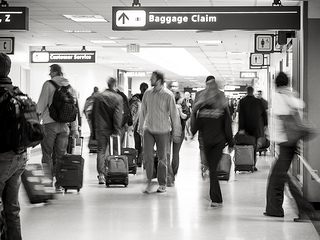 If you’re a chronic migraine sufferer, the prospect of traveling is probably difficult for you. Travel can be difficult for anyone and chronic migraine pain only makes travel more daunting. Travel can bring many triggers that can cause or aggravate migraines, such as stress, erratic sleep, poor eating habits, bright lights and more. Luckily, some methods exist to minimize migraines during your travels.
If you’re a chronic migraine sufferer, the prospect of traveling is probably difficult for you. Travel can be difficult for anyone and chronic migraine pain only makes travel more daunting. Travel can bring many triggers that can cause or aggravate migraines, such as stress, erratic sleep, poor eating habits, bright lights and more. Luckily, some methods exist to minimize migraines during your travels.
Travel Stress and Anxiety
Stress and anxiety are triggers of migraines and travel can cause high levels of both. Traveling can involve waking up at erratic hours, grabbing food as you go, changes in time zones, loud noises, unfamiliar surroundings, delays, temperature changes and many other stressors. You might have anxiety about your trip before you even leave, including worries about traveling itself, about whether you’ll arrive on time and about what you will do if certain scenarios arise. Many people are nervous about certain types of traveling like plane and train traveling.
Try to plan ahead to relieve some of these stressors. Some ways you can plan ahead are to:
-
Bring ear plugs or play music into headphones to block out some of the noise
-
Bring a book or other activity to distract yourself and help you stay calm during travel and in the case of delays
-
Bring items that can help you be more comfortable and stress-free like snacks and a travel pillow
During your travel, try to relax and stay calm with some of the following activities:
-
Perform deep breathing exercises
-
Listen to calming music
-
Try to get in the right state of mind through acceptance of uncontrollable situations and meditation
Eating During Travel
During travel, it’s highly likely that you won’t eat right. If you’re on the road, you might stop and grab an unhealthy snack at a gas station or quick market. If you’re at the airport, you’re likely to grab fast food or have a snack from a vending machine or on the plane. Or you might even skip meals while you’re traveling. Fast foods can have migraine triggers like nitrates or MSG. And skipping meals can trigger migraines as well. You might even grab more coffee than you would normally drink during the course of your travels, and excessive caffeine can be another trigger.
Instead, follow some of these tips while eating and drinking on your trip for migraine relief:
-
Make sure not to skip meals
-
Plan ahead by bringing healthy snacks and meals with you
-
If you have to eat out, choose healthier options at service stations, food courts or restaurants
-
Limit your caffeine because an excess can cause a migraine
-
Be sure to drink enough water
-
Avoid alcohol to soothe your nerves because it is another potential trigger of migraines
Additional Triggers and Solutions During Travel
Bright lights and loud noises can trigger migraines, and these sensory experiences are par for the course with travel. Airports and other areas are brightly lit with loud noises coming from people, airplanes, trains, cars and other sources. Use tools like eye pillows and ear plugs to block some of these things from overwhelming your senses. Try to find quiet areas while you wait for your plane or train.
A January 14, 2013 article on NYTimes.com highlighted the new trend of some airports and hotels incorporating yoga studios. This includes airports like San Francisco International Airport and Dallas-Forth Worth International Airport. See if your airport has one so you can find a quiet place to relax and possibly engage in relaxing yoga poses.
Motion sickness can also aggravate a migraine. Many forms of travel can induce motion sickness, such as traveling on a boat or dealing with the changes in elevation on a plane. The University of Maryland Medical Center explains that methods of preventing or alleviating motion sickness include:
-
getting proper air flow
-
eating healthy and light meals before travel
-
using cognitive-behavioral therapy or biofeedback techniques
-
using other alternative health options like homeopathy
-
taking medications for motion sickness, although you should discuss with your doctor how these medications might affect your chronic migraines
If you’re a chronic migraine sufferer, you know that the triggers differ for everyone. It can take some time, but knowing your personal triggers can greatly help you find migraine relief while you’re traveling. If certain foods are your main trigger, you’ll know to plan ahead by bringing foods or choosing wisely while eating out. If motion sickness triggers migraines for you, you’ll know to plan ahead with methods of preventing or managing motion sickness. So pay attention to your triggers and plan ways to prevent them or manage them for migraine relief during your travels.
Image Credit: Robert S. Donovan

